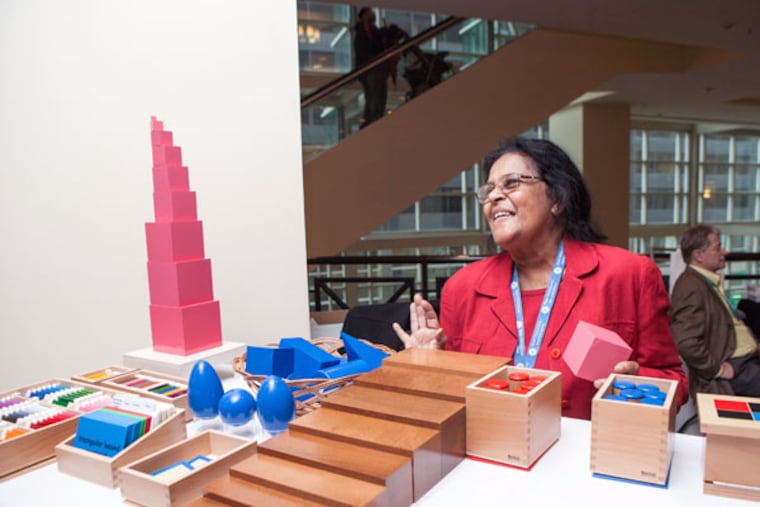Gathering celebrates the Montessori way
At the American Montessori Society's convention Saturday in Philadelphia, Lisa Porter Kuh said she has a vivid memory of the day she arrived at Greene Towne Montessori School in Center City in 1966.

At the American Montessori Society's convention Saturday in Philadelphia, Lisa Porter Kuh said she has a vivid memory of the day she arrived at Greene Towne Montessori School in Center City in 1966.
The private school had just opened, and Kuh said she felt at home when she spotted maps, puzzles, and handheld learning tools like the ones at the Montessori school she had attended in Wilmington.
The only surprise was the teacher. Kuh, now the director of early education for public schools in Somerville, Mass., said she had never seen a nun before. And the teacher was not only wearing a habit, she also was walking around the classroom in her socks because one of the children was polishing her shoes.
Greene Towne's director of advancement had an explanation for that.
"Meaningful work," said Erika Goldberg, citing one of the tenets of Montessori practice.
It was one small exchange among many as more than 4,000 Montessori educators from across the country and around the globe met at the Philadelphia Marriott Downtown to celebrate and discuss the latest trends and research related to the educational method that Maria Montessori, the Italian educator and physician, pioneered more than a century ago.
Older helping younger
That method includes prepared classrooms where teachers act more as guides than instructors. Students use materials designed to help them learn using all their senses. Classes are made up of students of varied ages, with older helping younger.
In Montessori schools, students also learn practical skills so that they can do things for themselves. The goal is creating confident, caring, independent learners.
"A lot of the modern-day brain research is supporting Maria Montessori's theses about how children learn," Goldberg said.
Richard Ungerer, executive director of the nonprofit American Montessori Society in New York, said research is one reason the Montessori movement has been growing. Some of the greatest growth in recent years is in charter schools and public school systems.
Super stressful
Conferencegoers also heard from Jennifer Senior, author of the best-seller All Joy and No Fun: The Paradox of Modern Parenthood, which looks at the effect raising children has on parents. She discussed why parenting has become so stressful.
"Eventually it wasn't enough to just shelter and educate your child," she said in her keynote address. "Now, today, we have to raise a species of superchild just to make sure that our children get a toehold in the shrinking middle class. That's very hard on them, and it's very hard on parents."
Unlike older, more established cultures, Senior said, American parents often are working without a script. Providing such a guide, she said, is the Montessori philosophy, which stresses independence and life skills.
"The Montessori philosophy is one of the few things that can serve as a cultural counterweight to this very strange trend we have in our culture right now where we have all become children's valets in the homework-extracurricular-industrial complex," Senior said.
Senior's son, who now attends a public school in New York City, spent three years at a Montessori preschool in Tribeca.
Senior said: "I credit his Montessori education with pretty much everything that is peachy about this child."